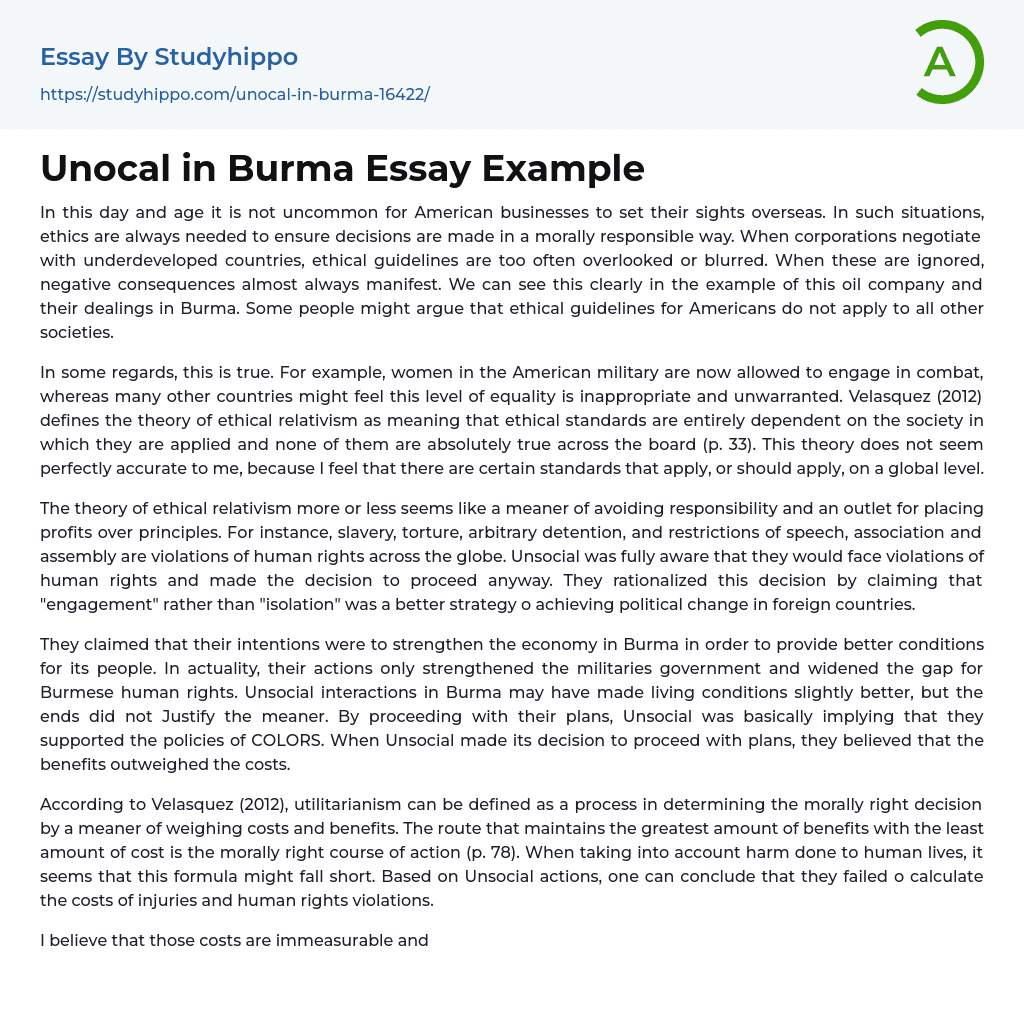In this day and age it is not uncommon for American businesses to set their sights overseas. In such situations, ethics are always needed to ensure decisions are made in a morally responsible way. When corporations negotiate with underdeveloped countries, ethical guidelines are too often overlooked or blurred. When these are ignored, negative consequences almost always manifest. We can see this clearly in the example of this oil company and their dealings in Burma. Some people might argue that ethical guidelines for Americans do not apply to all other societies.
In some regards, this is true. For example, women in the American military are now allowed to engage in combat, whereas many other countries might feel this level of equality is inappropriate and unwarranted. Velasquez (2012) defines the theory of ethical relativism as meaning that ethical standards are
...entirely dependent on the society in which they are applied and none of them are absolutely true across the board (p. 33). This theory does not seem perfectly accurate to me, because I feel that there are certain standards that apply, or should apply, on a global level.
The theory of ethical relativism more or less seems like a meaner of avoiding responsibility and an outlet for placing profits over principles. For instance, slavery, torture, arbitrary detention, and restrictions of speech, association and assembly are violations of human rights across the globe. Unsocial was fully aware that they would face violations of human rights and made the decision to proceed anyway. They rationalized this decision by claiming that "engagement" rather than "isolation" was a better strategy o achieving political change in foreign countries.
They claimed that
their intentions were to strengthen the economy in Burma in order to provide better conditions for its people. In actuality, their actions only strengthened the militaries government and widened the gap for Burmese human rights. Unsocial interactions in Burma may have made living conditions slightly better, but the ends did not Justify the meaner. By proceeding with their plans, Unsocial was basically implying that they supported the policies of COLORS. When Unsocial made its decision to proceed with plans, they believed that the benefits outweighed the costs.
According to Velasquez (2012), utilitarianism can be defined as a process in determining the morally right decision by a meaner of weighing costs and benefits. The route that maintains the greatest amount of benefits with the least amount of cost is the morally right course of action (p. 78). When taking into account harm done to human lives, it seems that this formula might fall short. Based on Unsocial actions, one can conclude that they failed o calculate the costs of injuries and human rights violations.
I believe that those costs are immeasurable and no amount of profitability Justifies violating basic human rights. If Unsocial were to use the rule-utilitarian model, then they probably would have abstained any involvement. Velasquez (2012) states that rule-utilitarianism meaner that an action is only right if it first abides by correct moral rules. If the initial action is not morally responsible, then the cost immediately outweighs the benefits, despite overall utility.
- Bangladesh essays
- Kuala Lumpur essays
- Malaysia essays
- Manila essays
- Philippines essays
- Singapore essays
- Vietnam essays
- Pakistan essays
- China essays
- Hong Kong essays
- India essays
- Japan essays
- Vietnamese essays
- Barangay essays
- Values of Life essays
- Ethical dilemma essays
- Normative Ethics essays
- Virtue Ethics essays
- Belief essays
- Deontology essays
- Moral essays
- Virtue essays
- Work Ethic essays
- Afghanistan essays
- Africa essays
- America essays
- Asia essays
- Australia essays
- Caribbean essays
- City essays
- Developing Country essays
- Dubai essays
- Earthquake essays
- Europe essays
- Fracking essays
- Georgia essays
- Middle East essays
- Natural Disaster essays
- New Zealand essays
- North Korea essays
- South Korea essays
- Thailand essays
- Travel essays
- Acceptance essays
- Age Of Enlightenment essays
- Child Observation essays
- Confucianism essays
- Conscience essays
- Critical Reflection essays
- Destiny essays




